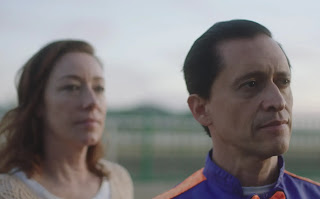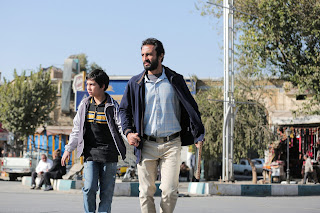The Killing of Kenneth Chamberlain
The Killing of Kenneth Chamberlain, available on HBO Max and featuring a terrific performance from Frankie Faison, tells the real-life story of Kenneth Chamberlain. A 68-year-old resident of White Plains, N.Y., Chamberlain accidentally set off his medical alert alarm. Policemen showed up at Chamberlain's public housing apartment and asked to be admitted.
From that point on, nothing went right.
The movie begins innocently enough. The police want to make sure that Chamberlain is OK. Alarmed by a police presence, Chamberlain refuses to open his door.
Unwilling to take "no" for an answer, the police exhaust their options until the most aggressive of them decides it's time to break down the door.
All the while, Chamberlain communicates with a medical alert operator, persuading her that his heart is fine and asking her to tell the police they're not needed. The emergency call is reversed, but the cops still won't leave.
One of the officers raises ridiculous questions about whether Chamberlain might not be alone? Is he trying to hide something?
Faison perfectly captures Chamberlain's agitated confusion, as well as his insistence on his rights. He knows the police have no search warrant and that there's no probable cause for them to insist on entry. He alternates exasperation and moments of lucidity as he talks on the phone with his sister and later his son. He wants to be left alone so that he can return to bed.
Director David Midell adds nuance. At least one of the officers understands that escalating behavior on the part of the police can only push Chamberlain further into desperation mode.
Midell's decision to film in a single room and in the cramped hallway outside Chamberlain's apartment creates 81 minutes of claustrophobic tension.
Based on recordings from the medical alert call, the movie chronicles an event that took place in 2011. Had it occurred today, more people probably would have known about a case in which a man lost his life. None of the officers were charged.
Be sure to listen to a recorded police remark that plays at the film's end. It may explain something about why the situation wasn't defused and why Chamberlain, a former Marine and a retired corrections officer, wound up dead.
A Shot Through the Wall
Unlike The Killing of Kenneth Chamberlain, A Shot Through the Wall is a fictional account in which a Chinese-American police officer accidentally fires his gun during a chase through a narrow apartment hallway. The bullet goes through a wall and kills an African-American teenager.
Set in Brooklyn, NY, A Shot Through the Wall serves up a complicated racial calculus. Mike Tan (Kenny Leu) had no idea who was behind the wall when he accidentally fired his gun. As a result, he insists that he can’t be accused of racial targeting.
Still, Mike knew where he was and unholstered his pistol anyway.
Director Aimee Long focuses on Mike and the increasingly pressurized environment that surrounds him.
We meet Mike's parents (Tai Ma and Fiona Fu), people deeply rooted in their community. Mike also has a Black fiancee (Ciara Renee). Her dad (Clifton Davis) is a cop and Mike's supervisor.
Despite Mike’s insistence that the accident had nothing to do with race, the local Black community protests. They don't want Mike to escape any consequences.
Leu conveys Mike's guilt and his anxiety as he's increasingly isolated: The police union initially supports him but ultimately yields to community pressure.
Among other things, Long looks at family dynamics, racial tensions, TV news appetites, and even the role of social media.
The movie's ending feels contrived, too pat to be believable but Long sustains interest as she tries for (without quite achieving) a big-picture look at a hot-button issue.








